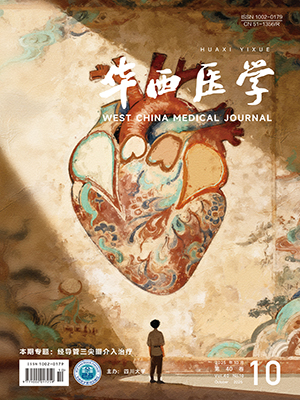| 1. |
惠艳娉, 席悦, 张巧俊. 脑卒中康复治疗进展. 华西医学, 2018, 33(10): 1295-1302.
|
| 2. |
王陇德, 彭斌, 张鸿祺, 等. 《中国脑卒中防治报告 2020》概要. 中国脑血管病杂志, 2022, 19(2): 136-144.
|
| 3. |
肖卫红, 吴碧玉. 脑卒中后吞咽障碍的康复研究进展. 中国康复理论与实践, 2017, 23(7): 783-787.
|
| 4. |
张祎辰, 高正玉, 王强, 等. 环咽肌失弛缓症的研究进展. 中国康复理论与实践, 2020, 26(3): 339-343.
|
| 5. |
Sivarao DV, Goyal RK. Functional anatomy and physiology of the upper esophageal sphincter. Am J Med, 2000, 108(Suppl 4): 27S-37S.
|
| 6. |
何容, 郭艳芹, 王怀林, 等. 环咽肌失弛缓的诊断与治疗发展现状. 牡丹江医学院学报, 2012, 33(4): 50-52.
|
| 7. |
许时良, 陈慧珍, 邓行行, 等. 环咽肌失弛缓所致吞咽障碍的治疗研究进展. 海南医学, 2014, 25(15): 2264-2265.
|
| 8. |
俞茗文, 万萍. 脑损伤后咽期吞咽障碍的康复治疗研究进展. 中国康复, 2017, 32(6): 518-521.
|
| 9. |
Cook IJ. Cricopharyngeal function and dysfunction. Dysphagia, 1993, 8(3): 244-251.
|
| 10. |
Krekeler BN, Howell RJ. Cricopharyngeus muscle dysfunction: a poorly defined disorder from diagnosis to treatment. Eur Arch Otorhinolaryngol, 2024, 281(9): 4519-4527.
|
| 11. |
叶婷, 张雪平. 肉毒毒素作用机制的研究进展. 微生物学免疫学进展, 2017, 45(2): 89-96.
|
| 12. |
Blitzer A, Sulica L. Botulinum toxin: basic science and clinical uses in otolaryngology. Laryngoscope, 2001, 111(2): 218-226.
|
| 13. |
孙晓佳. 肉毒素在喉科的临床应用. 转化医学杂志, 2021, 10(2): 126-129.
|
| 14. |
Kelly EA, Koszewski IJ, Jaradeh SS, et al. Botulinum toxin injection for the treatment of upper esophageal sphincter dysfunction. Ann Otol Rhinol Laryngol, 2013, 122(2): 100-108.
|
| 15. |
田晔, 孙丽娜, 王芹, 等. 球囊扩张术治疗环咽肌失弛缓的临床疗效研究. 中国医学创新, 2019, 16(1): 128-131.
|
| 16. |
窦祖林, 兰月, 万桂芳. 神经性吞咽障碍的康复治疗及其进展. 中华物理医学与康复杂志, 2006(11): 788-791.
|
| 17. |
Dewan K, Santa Maria C, Noel J. Cricopharyngeal achalasia: management and associated outcomes-a scoping review. Otolaryngol Head Neck Surg, 2020, 163(6): 1109-1113.
|
| 18. |
Laxague F, Herbella FAM, Schlottmann F. Cricopharyngeal myotomy and toxin botulinum injection for the treatment of upper esophageal sphincter disorders: a narrative review. Ann Esophagus, 2021: 5.
|
| 19. |
戴萍, 姚新阳, 朱丹, 等. 超声引导下 A 型肉毒毒素注射治疗脑卒中后环咽肌失弛缓症的效果分析. 现代实用医学, 2024, 36(8): 1110-1112.
|
| 20. |
Jung KT, Choi HK, Lee KB, et al. Endoscopic botulinum toxin injection in cricopharyngeal dysphagia. Korean J Med, 2010, 79(3): 301-305.
|
| 21. |
Kim MS, Kim GW, Rho YS, et al. Office-based electromyography-guided botulinum toxin injection to the cricopharyngeus muscle: optimal patient selection and technique. Ann Otol Rhinol Laryngol, 2017, 126(5): 349-356.
|
| 22. |
王利春, 黄凤慧, 苗维, 等. CT 引导下肉毒毒素环咽肌注射治疗真性延髓麻痹所致吞咽障碍 1 例报道. 中国康复理论与实践, 2019, 25(4): 477-480.
|
| 23. |
Huai J, Hou Y, Guan J, et al. Botulinum toxin A injection using esophageal balloon radiography combined with CT guidance for the treatment of cricopharyngeal dysphagia. Dysphagia, 2020, 35(4): 630-635.
|
| 24. |
樊留博, 张露丁, 罗咪咪, 等. 导管球囊定位联合超声引导下环咽肌 A 型肉毒毒素注射治疗环咽肌失弛缓症吞咽障碍疗效观察. 浙江医学, 2022, 44(3): 263-268.
|
| 25. |
刘超, 李元, 谭智, 等. 消化内镜引导下肉毒毒素注射联合球囊扩张治疗脑干梗死后环咽肌失弛缓的效果. 中南大学学报(医学版), 2023, 48(8): 1203-1209.
|
| 26. |
温红梅, 万桂芳, 唐志明, 等. 超声、球囊联合肌电引导注射肉毒毒素治疗脑卒中后环咽肌失弛缓: 1 例报告. 中国康复医学杂志, 2019, 34(9): 1088-1091.
|
| 27. |
Xie M, Zeng P, Wan G, et al. The effect of combined guidance of botulinum toxin injection with ultrasound, catheter balloon, and electromyography on neurogenic cricopharyngeal dysfunction: a prospective study. Dysphagia, 2022, 37(3): 601-611.
|
| 28. |
Mohajir WA, Khurana S, Singh K, et al. Botulinum toxin a use in the gastrointestinal tract: a reappraisal after three decades. Gastroenterol Hepatol (N Y), 2023, 19(4): 198-212.
|
| 29. |
中国康复医学会吞咽障碍康复专业委员会. 中国吞咽障碍康复管理指南(2023 版). 中华物理医学与康复杂志, 2023, 45(12): 1057-1072.
|
| 30. |
徐军, 冀静. A 型肉毒素的临床应用. 中国城乡企业卫生, 2018, 33(12): 42-45.
|
| 31. |
Gordon MF, Barron R. Effectiveness of repeated treatment with botulinum toxin type A across different conditions. South Med J, 2006, 99(8): 853-861.
|
| 32. |
Ashman A, Dale OT, Baldwin DL. Management of isolated cricopharyngeal dysfunction: systematic review. J Laryngol Otol, 2016, 130(7): 611-615.
|
| 33. |
Xie M, Dou Z, Wan G, et al. Design and implementation of botulinum toxin on cricopharyngeal dysfunction guided by a combination of catheter balloon, ultrasound, and electromyography (BECURE) in patients with stroke: study protocol for a randomized, double-blinded, placebo-controlled trial. Trials, 2021, 22(1): 238.
|




